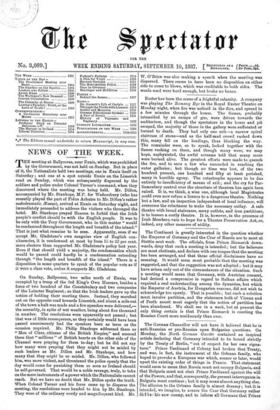Exeter has been the scene of a frightful calamity. A
company was playing The Romany Rye in the Royal Exeter Theatre on Monday night, when fire was noticed in the flies, and spread in a few minutes through the house. The flames, probably intensified by an escape of gas, were driven towards the auditorium, and though the spectators in the boxes and pit escaped, the majority of those in the gallery were suffocated or burned to death. They had only one exit—a narrow spiral staircase of stone—and as the half-mad crowd rushed down this, many fell on the landings, thus blocking the way. The remainder were, so to speak, locked together with the flames rushing on them, and though many were, we may hope, asphyxiated, the awful screams told that many more were burned alive. The greatest efforts were made to quench the fire, and to save a few who succeeded in reaching the outer galleries ; but though no time was lost, of the two hundred present, one hundred and fifty at least perished, many in horrible agony. The catastrophe appears to be due entirely to insufficiency of means of exit ; and the cry for Par- liamentary control over the structure of theatres has again been raised. It is, we think, a wise one, although local Magistrates could even now refuse a licence to a dangerous theatre. Nothing but a law, and an inspection independent of local influence, will overcome the reluctance to make the necessary outlay. A safe theatre with broad staircases, many outlets, and iron partitions', is to lessees a costly theatre. It is, however, in the presence of Irish Members, vain to hope for a Theatre Preservation Act, or, indeed, any other measure of utility.


































